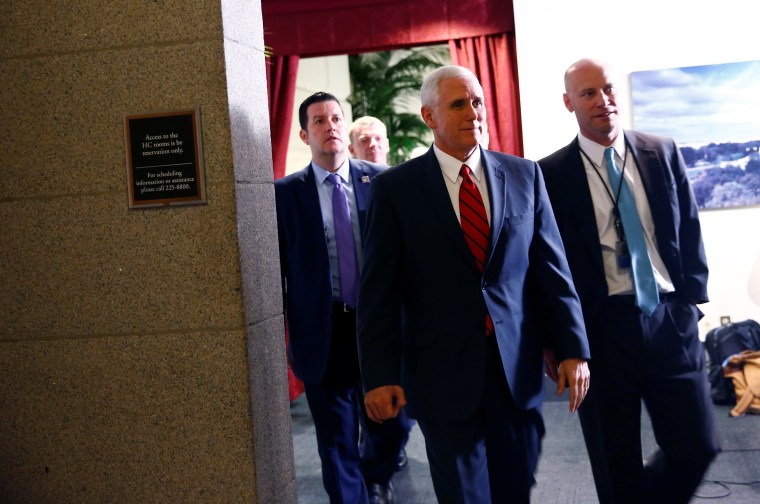With bipartisan support, the House passed a measure a couple of weeks ago to block Donald Trump's emergency declaration, in which he granted himself the power to redirect funds to border barriers, in defiance of Congress and public will. Over the next day or two, the Republican-led Senate will vote on the same bill.
On the surface, the outcome seemed obvious. Several GOP senators have already stated publicly that they will vote for the measure, and Senate Majority Leader Mitch McConnell (R-Ky.) conceded to reporters last week that it will pass. Though proponents of the bill only need four Republican votes, Sen. Rand Paul (R-Ky.) suggested last week the total could be as high as 10.
A lot can happen in a week, though.
A reporter asked Rand Paul yesterday whether he still believes there are 10 GOP votes in place to reject the White House's controversial policy. "Well, they're being beaten up right now, so if you see anybody that's got blood dripping out of their ear, they may be changing," he replied.
In this case, Team Trump isn't just pushing Senate Republicans to ignore their principles and toe the party line, though that's certainly part of the push. As the Washington Post reports, there's also a possible deal in the works.
Although four Republican senators have already announced they will vote to nullify the president's emergency declaration, one of them — Sen. Thom Tillis (N.C.) — publicly indicated Tuesday after a private meeting with Vice President Pence that he could change his position if the administration and senators strike a deal on revising the National Emergencies Act. That would be enough to kill the resolution in the Senate, provided no other GOP senators oppose Trump's declaration or alter their position.
The basic contours of the deal are as follows: if enough Senate Republicans agree to defeat the pending resolution, the White House will agree to changes to the National Emergencies Act -- the law that Trump appears to have abused through his emergency declaration, and the law that empowers Congress to block the presidential effort.
Though the details of the changes aren't yet available, Sen. Mike Lee (R-Utah) is reportedly taking the lead on revising the National Emergencies Act so as to limit presidential power going forward.
And if that doesn't sound to you like an especially good deal, your instincts are sound.
For one thing, we have no idea if Trump would agree to limit his own power. There have been other instances in which Pence has tried to negotiate on behalf of the White House, only to have the president reject the terms his own vice president offered lawmakers.
For another, even if Republicans agreed to change the National Emergencies Act, it wouldn't be retroactive. In other words, Trump's recent gambit would be unaffected by the proposed "fix," leaving GOP senators opposed to his policy with nothing but tepid assurances about the future.
Complicating matters, if Senate Republicans and the White House struck a deal to amend the National Emergencies Act, those changes would still have to be approved by the Democratic-led House -- and House Speaker Nancy Pelosi (D-Calif.), who is not a party to this week's negotiations, announced this morning that her chamber will not approve the Republicans' solution.
"The House will not take up this legislation to give President Trump a pass," Pelosi said in a written statement.
The signal from the House Speaker isn't subtle: Senate Republicans who go along with Trump's dubious stunt because of a backroom deal will leave the fight empty handed.
The goal is to create a binary choice for GOP senators: either vote to block the White House's unpopular gambit or vote to allow it. It comes down to principle or party. There is no third option or side deal to be reached.
Watch this space.
Postscript: In case this isn't obvious, even if the bill were to pass, the president would veto it, and there aren't nearly enough votes in place to override that veto. So why is the White House going to all of this effort to derail a proposal that will inevitably fail in the end?
In part because of the scope of the embarrassment Trump will feel if he's forced to use his veto pen for the first time, and in part because congressional disapproval of the president's emergency declaration is likely to matter in the courts, where the policy is facing a series of credible lawsuits.
